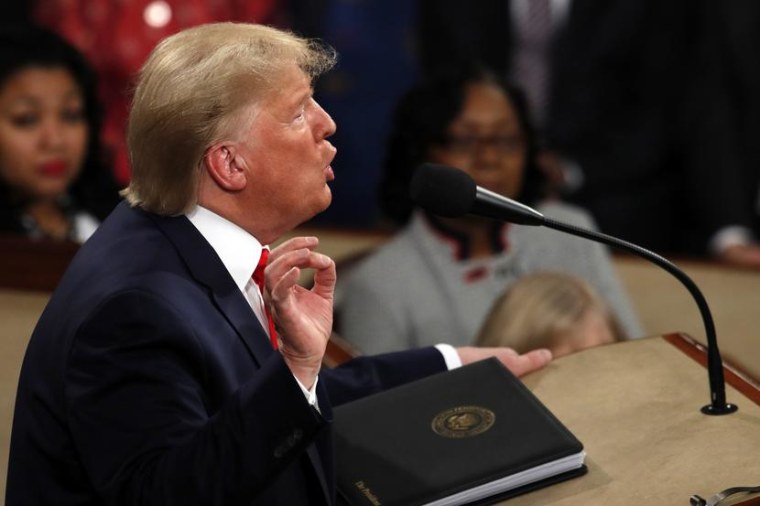In his final State of the Union address before Election Day 2020, Donald Trump's pitch was easy to predict. The president would say that the state of the nation is strong; he'd take credit for low unemployment; he'd point to healthy economic growth; he'd celebrate modest inflation and high economic confidence; and he'd promise more of the same so long as he stays in office.
And if he'd delivered that message, it would've been inoffensive and, for those inclined to support the president, persuasive. But as is too often the case, Trump found it necessary to lie, counting on voters to not know the difference. From the transcript of his remarks:
"Three years ago, we launched the great American comeback. Tonight, I stand before you to share the incredible results.... The years of economic decay are over.... I am thrilled to report to you tonight that our economy is the best it has ever been. [...]
"From the instant I took office, I moved rapidly to revive the U.S. economy.... If we hadn't reversed the failed economic policies of the previous administration, the world would not now be witnessing this great economic success."
One of Trump's worst habits is his willingness to blur the line between what he wants to be true and what he presents as true. During his tenure, the Republican has, for example, occasionally described imagined legislation that he thought sounded good, and he's pretended the bills were real. He's described imagined conversations, and he's pretended that they're real. He's even described imagined accomplishments, and he's pretended that they're real.
Last night, however, the president described an imagined economic record, and he pretended it was real -- except it's not.
In reality, Trump inherited a healthy, growing economy with falling unemployment. After three years in office, American job growth has slowed; economic growth has fallen short of both the growth we saw in Obama's second term and Trump's ambitious promises; wages have stagnated; income inequality has worsened; and the nation's finances have deteriorated with very little to show for it.
Trump added in his national address that "we are restoring our nation’s manufacturing might," despite the fact that the U.S. manufacturing sector actually fell into a recession last year.
He went on to say, "After losing 60,000 factories under the previous two administrations, America has now gained 12,000 new factories under my administration, with thousands upon thousands of plants and factories being planned or being built." Take a wild guess when the factory revival actually began. If you said, "Under Obama," give yourself a gold star.
The point is not to suggest the economy is in bad shape. It's not and it'd be foolish to suggest otherwise. Rather, the point is Trump need not lie about his record or exaggerate the economy's health. The truth should be good enough: he inherited a healthy economy, and at least so far, he hasn't derailed the recovery that began a decade ago.
But the truth wouldn't make Barack Obama look bad -- the Republican's preoccupation with his predecessor is getting a little creepy -- and the facts wouldn't position Trump as some kind of conquering hero.
He's counting on voters not knowing any better, but no one should be fooled.
MORE: Today's Maddowblog

